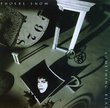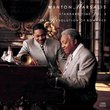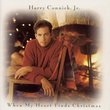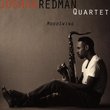| All Artists: Antonio Vivaldi, Cecilia Bartoli, Il Giardino Armonico Title: Cecilia Bartoli - The Vivaldi Album / Il Giardino Armonico Members Wishing: 0 Total Copies: 0 Label: Polygram Records Release Date: 2/13/2001 Album Type: Limited Edition Genres: Pop, Classical Styles: Vocal Pop, Opera & Classical Vocal, Historical Periods, Baroque (c.1600-1750) Number of Discs: 1 SwapaCD Credits: 1 Other Editions: Cecilia Bartoli - The Vivaldi Album / Il Giardino Armonico UPC: 028946786321 |
Search - Antonio Vivaldi, Cecilia Bartoli, Il Giardino Armonico :: Cecilia Bartoli - The Vivaldi Album / Il Giardino Armonico
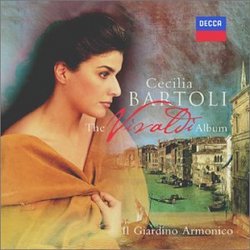 | Antonio Vivaldi, Cecilia Bartoli, Il Giardino Armonico Cecilia Bartoli - The Vivaldi Album / Il Giardino Armonico Genres: Pop, Classical
Mezzo-soprano Cecilia Bartoli could easily rest on her laurels as one of today's most charismatic, characterful singers for her lively portrayals of Mozart and Rossini heroines. But it's been particularly exciting to obser... more » |
Larger Image |
CD DetailsSynopsis
Amazon.com Mezzo-soprano Cecilia Bartoli could easily rest on her laurels as one of today's most charismatic, characterful singers for her lively portrayals of Mozart and Rossini heroines. But it's been particularly exciting to observe her growth as an artist in exploring the exuberant world of Baroque opera, with its range of pyrotechnic demands--both vocal and emotional. Bartoli's show-stopping virtuosity in a Vivaldi aria from her Live in Italy recital gave a tantalizing sample of her finesse in that style. For The Vivaldi Album (originally released in 1999), Bartoli conducted extensive research into the composer's manuscripts (a documentary tracing her quest has been made). Although he's best known for his concertos--in typically Baroque fashion, two of the arias here, in fact, recycle material from The Four Seasons--Antonio Vivaldi was a ferociously prolific composer of operas for the cutting-edge theaters of his time, and the arias gathered here demonstrate the word-painting magic of his music, from the sylvan setting of dueting flageolets in "Di due rai languire costante" to the storm-tossed passions of "Anch'il mar par che sommerga," where Bartoli spins out ripples of rapid-fire coloratura with a gravity-defying accuracy that will leave your head spinning. In addition to many such examples of vocal acrobatics, Bartoli brings exquisite nuance and limpid tone to the delicate echo effects of "Zeffiretti, che sussurrate," and there's no better test for the remarkable flexibility of her range--full and dusky at the bottom and thrilling at the top--than the huge intervallic leaps of "Dopo un'orrida procella." With her naturally large voice, Bartoli can at times tend to histrionic excess (in the recitative to the short aria from "L'Orlando finto pazzo," for example), but the expressive color of her phrasing is wonderfully matched throughout by the Giardino Armonico's lively panache. All power to Bartoli in her goal of reviving this neglected aspect of Vivaldi's output. The reissue includes additional photos and text, packaged together as a visually enticing booklet to accompany this splendid CD. --Thomas May Similarly Requested CDs
|
CD ReviewsA Revelation 11/04/2003 (5 out of 5 stars) "I was amazed with this album of super fine music. I had known all my life that Vivaldi wrote tons of operas, but finding them, or the scores of them, was nearly impossible. In time I found a few, and was I ever amazed and disappointed. The published scores that were available were what was common practice of that time: there were the vocal lines and a figured bass and nothing more. There were no indications of orchestration. Even with that little bit, I was shocked with the intensity and complexity of this vocal writing. This man knew how to write for the voice. Until singers are willing to research his works, we, the public, will know him for a very orchestra suites and nothing more. The result will be a very stilted view of what the man had to offer. Now getting to the performance by Bartoli. She really loves this music, as you can tell. Yes, she is mannered in some of the things she does, but that is her way of seeing the music. Her technical skills are amazing, and her interpretations (the "drama" behind the music) is just as intense. Some think Bartoli has a strong voice. Actually, her voice is very small, if you have heard her in performance (they weren't even sure she would be heard when she sang at the Met), and it has a very delicate quality, even when being "brash." Recordings give you the impression she has a much larger sound than she does, but that is because small voices record truer and better than large ones (the industry still can't capture large voices at all). However, even with a small voice, in performance she is breathtaking. She makes the music live. She has weird mannerisms one sees that to American trained singers are completely unacceptable (weird facial expressions, strange things done with he mouth and teeth, head bobbing, etc), but that has never distracted from her overall intensity. Yes, she is intense. You are literally taken away with her interpretation, and her skills. Interestingly, she is more famous in music circles for her cancelations (she cancels more performances in a year than she actually sings). I love this recording, not only because of the music, but because I have seen her sing some of this music live. She really LIVES what she sings, and that comes across in this recording. A special note: in the little booklet that comes with the recording, Bartoli herself writes her impressions of this music. It is extremely insightful. Whether you like her or not, you have to admire the work she has done to make this music live and be as authentic in interpretation as she can. It is her love of this music that has caused her to record this album. I am thankful she did, for now, I can take those old scores I have and get a better understanding of what the composer was doing. Would that more singers would explore new/old works, and I think it would be far more interesting to have them write their impressions of the music they are singing than the standard academic essays we must read. Reading about how she came to this music, in her own words, gave a different dimension to listening. Now I was listening to see if she was successful in communicating what she felt this music had to offer. SHE WAS." Cecilia and Vivaldi stardustraven | Europe | 08/25/2002 (4 out of 5 stars) "Since I prefer music which was composed before 1750, I was very glad with the purchase of Cecilia Bartoli's Vivaldi album. Although this disc is definitely an interesting and wonderful recording, it's not without its flaws. Cecilia Bartoli presents here to the listener a compilation of Vivaldi's neglected opera arias. Ms. Bartoli's treatment of these arias [which she has researched herself] is certainly fresh and appealing. For the singer and her listener this music is certainly demanding. The music requires of Cecilia Bartoli to go from rapid fire passionate outbursts to tender pianissimo's. The listener should further take into account that the composers of the Baroque period were certainly not above re-using music scores. This disc provides the listener with two clear examples of such practices. In the first aria 'Dell'aura al sussurrar' we hear the beginning of the 'Spring' concerto of 'The Four Seasons' and in 'Gelido in ogna vena', music from 'The Winter' was used. Cecilia Bartoli's interpretation of these pieces is heartfelt, passionate, intense and tender [she's certainly well-matched with Vivaldi's acrobatics]. But sometimes as in the second aria 'Dopo un'orrida procella' the fireworks of Vivaldi leave her a bit hoarse and out of breath. Il Giardino Armonico conducted by Giovanni Antonini lend her an excellent and spirited support. Furthermore she is joined in the first aria by the Arnold Schoenberg Choir. However, this is a great disc and some of my favourites here are: 'Dopo un'orrida procella', her tender and wonderful rendition of 'Zeffiretti che sussurate' with beautiful echo effects (which were often used for Baroque music), 'Gelido in ogni vena', the storm aria 'Anch'il mar par che sommerga' or the martial aria 'Di trombe guerriere'. The accompanying booklet contains information about Vivaldi, Cecilia Bartoli, Il Giardino Armonico and provides the lyrics with translations. Definitely a disc by Cecilia to own. by stardustraven" Pure and hot-blooded Italian beauty and joy! 01/29/2000 (5 out of 5 stars) "The ensemble is Italian, the singer Italian, and the composer Italian! What a blessing this CD is! It's so purely and perfectly Italian. The most important thing, however, is that the singer, the ensemble, and the composer Vivaldi are totally in one in their temperament, spirit, and style. Bartoli is known for her intensity, fantasy, imagination, virtuosity, total sense of joy, and directness. So is the beautiful and exciting ensemble! Vivaldi, too, is made of these attributes, both in his virtuosic violin performance and in his music.In this recording, composer and performers are in one. The execution is beyond mere perfection. The performance is inspired, the music relived, and it opens the world of early 18th century Venice in front of our eyes!The best entertainment you'll have! The more you listen to it, the more beautiful, magical, awe-inspiring it becomes and the more you'll wonder! Personally I think the 6th track is the most beautiful, sensuous and the most Vivaldian. Its dark, exotic , and mesmerizing harmonies and melodic turns are beyond description. That's something only Vivaldi could do and something that can only be found in his music.The 2nd track, is great fun. The vocal writing is so delightful and exciting! The last track is very crowd-pleasing and I love it! In this martial aria, we can almost hear the cheer of the audience when the singer finishes that sensational trill! It makes the audience crazy!This is definitely one of the greatest (if not THE greatest) recording of Vivaldi's music. If this CD cannot make people interested in Vivaldi, nothing will."
|

 Track Listings (13) - Disc #1
Track Listings (13) - Disc #1
